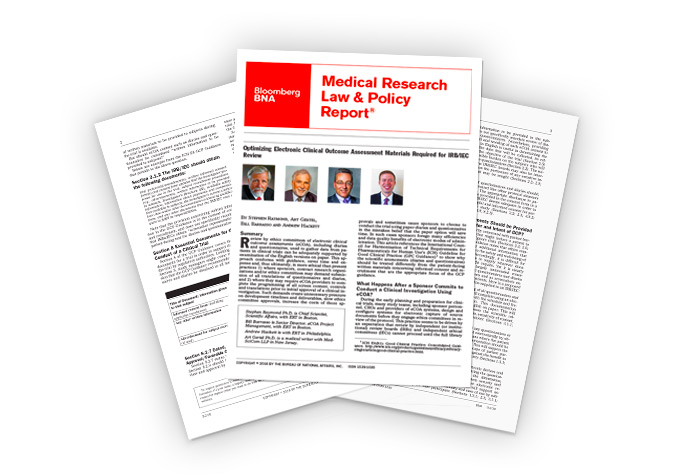There is an ongoing debate about the most efficient and ethical approach to reviewing electronic Clinical Outcome Assessments (eCOA). The prevailing assumption has been that ethics committees should review electronic versions of all translations of patient-facing questionnaires and diaries before giving their approval. A more streamlined and effective approach could not only save time and resources but also uphold the ethical standards of clinical research.
A Burden on Time and Resources
The process of ethics committee review often involves meticulous scrutiny of trial-related documents, with the aim of safeguarding patient rights, welfare, and well-being. However, the existing practice of demanding all translations of eCOA materials as screenshots has come under scrutiny. This practice places a significant burden on study teams, sponsors, and providers of eCOA systems. Additionally, it can lead to unintended delays in study approvals, hampering the timely initiation of clinical trials and, consequently, access to potential therapies for patients.
An Ethical and Efficient Approach
Advocates of change argue that the focus of ethics committee reviews should center on patient rights, welfare, and safety, rather than demanding exhaustive translations of all eCOA materials. This perspective is in line with the International Council for Harmonisation of Technical Requirements for Pharmaceuticals for Human Use’s (ICH) Guideline for Good Clinical Practice (GCP), which emphasizes patient consent, recruitment, and safety. The key points in favor of this revised approach include:
Contextual Examination: ICH GCP specifies that ethics committees should review written information intended for informed consent and recruitment purposes. This implies that the review of diaries and questionnaires, which serve a scientific purpose in data collection, should be treated differently from consent-related materials.
Scientific Relevance: A thorough examination of the English versions of eCOA materials allows ethics committees to assess the scientific relevance, history of validation, and sensitivity of content.
Patient Burden: Ethical oversight should focus on evaluating the potential burden on trial participants and assessing any incentives that might influence patient participation.
Quality of Translation: Instead of requiring exhaustive translations of eCOA content, ethics committees can rely on certificates of translation (CoTs) as evidence of rigorous translation processes.
Efficiency: Approaching eCOA review in this way can streamline the ethics committee approval process, reduce administrative burden, and facilitate timely initiation of clinical trials, thus expediting access to potential treatments for patients.
Clinical ink’s Expertise Aligns with this Approach
1. Streamlined eCOA Review
Clinical ink’s eCOA solutions can significantly streamline the review process by providing comprehensive questionnaires and diaries, allowing ethics committees to focus on the scientific relevance, patient burden, and safety aspects. Clinical ink technology empowers trial sponsors to present these materials in an organized, standardized, and easily accessible manner, reducing administrative complexity and accelerating the review process.
2. Scientific Scrutiny and Patient Welfare
By providing accurate and validated eCOA instruments, Clinical ink helps sponsors uphold the highest quality standards in data collection while ensuring that patients’ needs and well-being are prioritized.
3. Efficient Translation Management
Clinical ink solutions facilitate efficient translation management by enabling accurate and timely translations of eCOA content while maintaining quality and consistency. This feature resonates with the recommendation to provide certificates of translation (CoTs) as evidence of rigorous translation practices.
4. Timely Study Initiation
Clinical ink supports timely study initiation, reducing the time-to-market for potential therapies. This aspect is crucial for both the scientific advancement of treatments and improving patient access to novel interventions.
5. Access to Quality Data
Clinical ink eCOA solutions ensure that high-quality data is collected from patients, addressing the potential compromise on data quality when sponsors resort to paper diaries and questionnaires due to perceived efficiency gains.
Embracing a New Ethical Standard
The proposed shift in eCOA review practices encourages ethics committees to focus on their core responsibilities while allowing the scientific community to maintain the high standards required for research integrity. By offering comprehensive eCOA solutions, Clinical ink empowers clinical trial stakeholders to navigate the evolving landscape of ethical oversight and operational efficiency while advancing medical research and improving patient care.
Contact us to learn more about how Clinical ink’s eCOA solutions can enhance your trial efficiency.

Bill Barrasso, Chief Compliance Officer at Clinical ink, contributed to a Bloomberg BNA article that highlights the challenges and shift in thinking outlined above.
Read the full article, “Optimizing Electronic Clinical Outcome Assessment Materials Required for IRBIEC,” by submitting our interest form.
